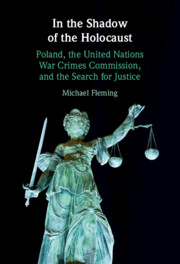3 results
5 - The UNWCC, Law, and Inter-Allied Politics
-
- Book:
- In the Shadow of the Holocaust
- Published online:
- 23 December 2021
- Print publication:
- 06 January 2022, pp 144-171
-
- Chapter
- Export citation
Introduction
-
- Book:
- In the Shadow of the Holocaust
- Published online:
- 23 December 2021
- Print publication:
- 06 January 2022, pp 1-15
-
- Chapter
- Export citation

In the Shadow of the Holocaust
- Poland, the United Nations War Crimes Commission, and the Search for Justice
-
- Published online:
- 23 December 2021
- Print publication:
- 06 January 2022

